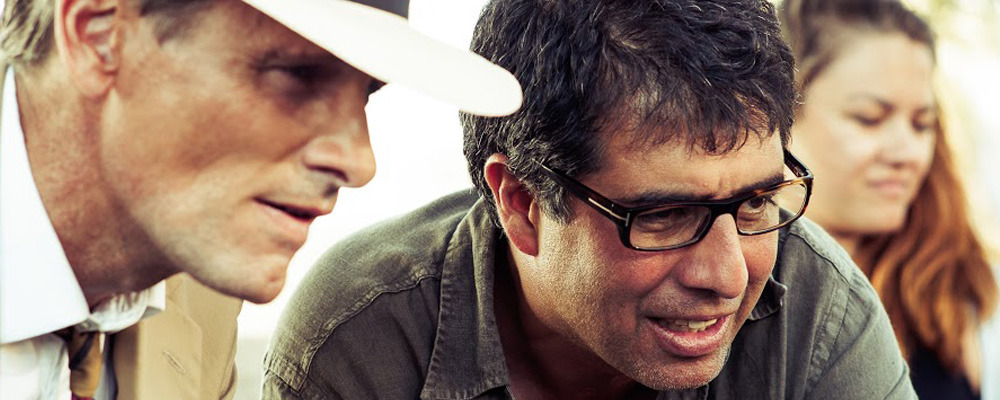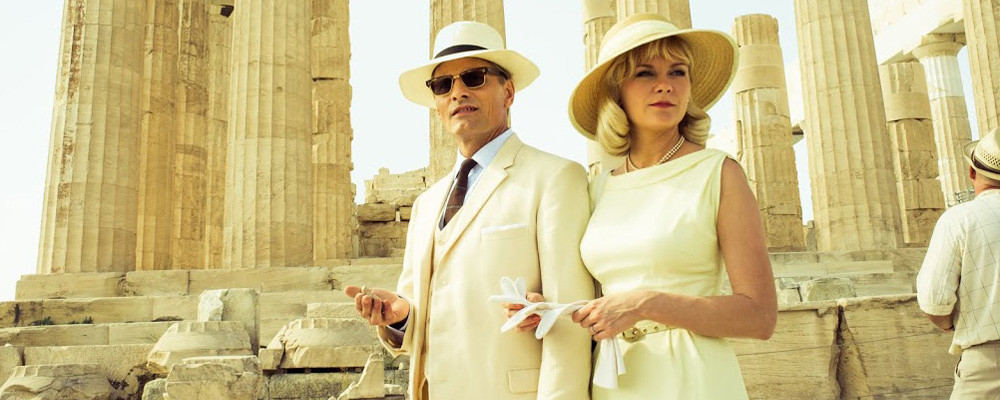Hossein Amini Talks About His Directorial Debut for ‘The Two Faces of January’
Greg Vellante
Hossein Amini may not be a household name, but many filmgoers have seen his work over the years. For over two decades, Amini has worked as screenwriter on an eclectic list of popular features, including Drive, Snow White and the Huntsman, and The Wings of the Dove, which won him an Academy Award nomination in 1998.
Born in Iran and raised in England, Amini is a self-proclaimed movie buff who has built up an impressive body of screenwriting work. He both wrote and directed his latest effort The Two Faces of January, which is an adaptation of Patricia Highsmith’s novel of the same name. Shot as a Hitchcockian thriller, the film stars Viggo Mortensen and Kirsten Dunst as a couple who befriend a stranger (played by Oscar Isaac) and get caught up in the death of a private detective.
This film marks a landmark for Amini, as he has previously only helmed the short film Catch in 1989. Amini sat down with Entertainment Voice to talk about his feature directorial debut, thoughts on writing, and the Hitchcockian and other influences that permeate The Two Faces of January.
In 1989 you directed the short Catch, and over the past 25 years you’ve written a fairly eclectic group of scripts. What was it about The Two Faces of January that finally made you want to call the shots?
I read the book around college and it was around the same time I made that short, and I thought that it would be my first feature film, but did not expect it would take twenty-odd years to get it made. I did other stuff in writing, but this was always my secret project in the background that I wanted to direct. There were just a lot of conditions. And I wonder what it would have been like had I done it in my twenties instead of my forties.
How was this experience different in bringing a story to life this time around, not only through words but through visuals?
I loved it. I’m a complete movie nut, and what I’ve always loved about movies is that it’s really the visual side of it. I mean dialogue I find very difficult to write, and most of the scripts I write tend to be dialogue-light and [have] far more description. It was great to work out the visual aspects this time around. I just felt so much closer to this precious art which is filmmaking. It’s something I’ve wanted to do for so long and I’ve lived with it for so long. I mean every time I write a screenplay I imagine it in my head as if I were at the movies. It was just fantastic to finally be able to really do it.
The film looks and feels strongly influenced by the work of Alfred Hitchcock, but it still holds its own by honoring him. How did you achieve this balance while crafting the film, and what other influences appealed to you during the writing and production process?
Well, there’s one side of Hitchcock and American film noir, which I’m obsessed with, just those thrillers of that period. There’s also the French New Wave and also the Italian cinema in the influence. One of my favorite directors is Antonioni, just in the way he captures human relationships. I had many different influences, and it’s hard to get the balance of those influences. It’s not always successful, but it’s what I am interested in.
You have a fantastic trio of actors. Tell me about the casting decisions surrounding Viggo Mortensen, Kirsten Dunst and Oscar Isaac, and what you enjoyed about their contributions to the characters.
One thing they all shared, to great effect I may add, is how much of them and their own weaknesses they were able to allow into the characters. For example, Viggo is playing someone who is a drunk [as well as] paranoid [and] jealous. These aren’t attractive human qualities, particularly for a male movie star. And I think [the actors have the] ability to [convey] that [without being] worried about being emotionally ugly or cruel or whatever. We rehearsed and I had a week with them, but it was really all about them, their relationship and what they shared with these characters. And then I was able to, in rewrites, kind of re-color these characters with the individual personalities of the actors. It’s a very collaborative process, [and] they were very involved because of that.
Do you prefer adapting novels or creating original stories, and what are the distinct differences between the two for you?
The thing I love about adapting novels is that it’s so much a collaborative thing where suddenly you have these characters and situations just handed to you to work with. And I’ve always been a big reader. But [it’s] not just [about] capturing the book, because you need to adapt, so it’s that interaction with the book that I love. There is something tough about originals where filmmaking is a brutal process. There’s money involved, other people involved, and there’s so much that can go wrong. As for adapting, you have some middle ground and somewhere to go to in writing. With originals, it’s more personal and painful. The idea of writing an original and then having it transformed into something else is too painful.
Are you planning to direct any originals or other work in the future?
I really want to write an original next, and I’d love to direct it if I can. But I know there’s something about that process which is always going to be different than adapting a book.”
What did you learn most over the course of this production, especially with it being your first time calling the shots?
[Laughter] I learned you’re kind of in the hands of God. There is so much that happens between the script being finished and the film being made. You’re spending 40 to 50 days or whatever and so many things can go wrong. And the script is such a fragile, vulnerable thing. But writing is just the tip of the iceberg, and there is so much more going on that you just can’t control.
The locales in the film are so gorgeously shot. What was it like filming on location in Greece? What was the most memorable day you had while shooting there?
There was an amazing day where we shot on the Acropolis, and it was a really tough day because we were not allowed to stop tourists, and in every frame there are about 500 people watching. But it was very exciting in a way as a first time director to have people watching the filmmaking. It was great…. After everyone had left and I was alone in the Acropolis, I could soak it in. And that’s what’s so great about filmmaking, having access to these places you would not normally have. [It was] just so beautiful.
The Two Faces of January opens in theaters on September 26.


